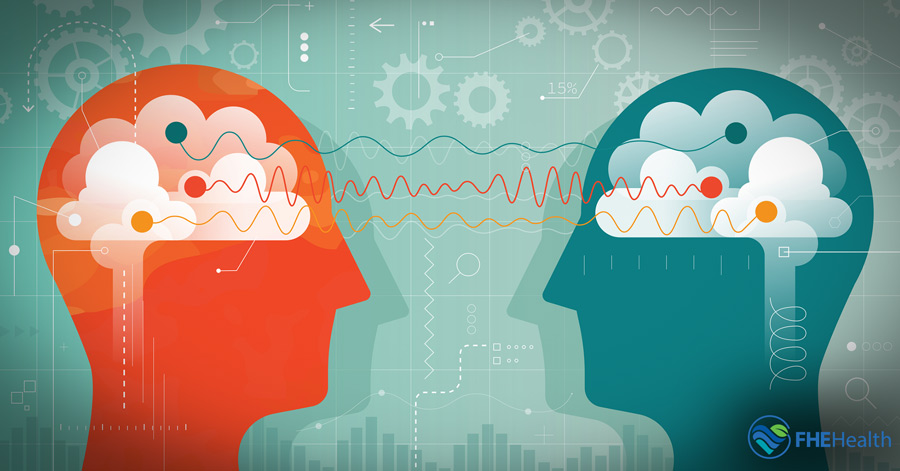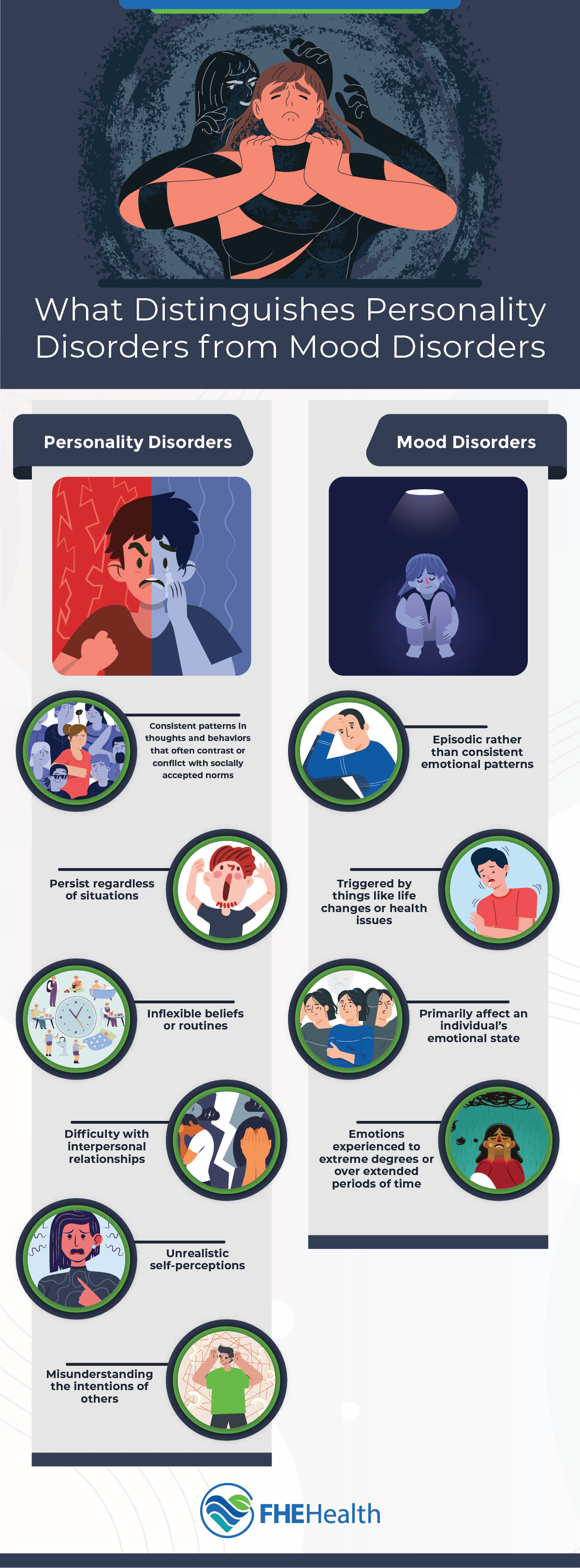
There are many types of mental health disorders, and their characteristics and symptoms can at times resemble one another. As types of mental illness, personality disorders and mood disorders often have similar presentations and overlapping symptoms, and it can be difficult to distinguish between the two.
With both mood and personality disorders and their respective subcategories affecting millions of Americans each year, it’s important to understand what these disorders are, how they affect people, how they’re diagnosed, and the treatment options available.
Understanding What Personality Disorders Are and How They Differ from Mood Disorders
Research shows that personality disorders as a group may affect as many as 9.1 percent of the population. According to the DSM-5, personality disorders are defined as “an enduring pattern of inner experience and behavior that deviates markedly from the expectations of the individual’s culture.
In other words, individuals with personality disorders demonstrate consistent patterns in thoughts and behaviors that often contrast or conflict with socially accepted norms. Rather than presenting in episodes as with mood disorders, personality disorders present an enduring pattern that manifests in areas such as impulse control, cognition, and interpersonal functioning. As such, personality disorders can have a significant impact on relationships with friends and loved ones, performance at work or school, and other important aspects of life.
It’s unclear what causes personality disorders, but research suggests that a number of contributing factors can lead to the development of personality disorders. These factors may include genetic mutations, brain development differences, cultural factors, and childhood trauma.
Different Types of Personality Disorders and How They Affect Thoughts, Behaviors, and Emotions
People with personality disorders often struggle with challenges relating to inflexible beliefs or routines, interpersonal relationships, self-perceptions, and perceptions of other people’s intentions. There are several types of personality disorders, each of which can affect an individual’s emotional state, thoughts, and behaviors in different ways.
Common personality disorders include:
- Borderline personality disorder: A pattern of unstable personal relationships, impulsive behaviors, and low self-worth.
- Avoidant personality disorder: Individuals often show extreme shyness and nervousness, sensitivity to negative judgment, and feelings of inadequacy.
- Narcissistic personality disorder: Individuals may have an elevated or grandiose sense of self-importance, lack empathy, and require admiration or attention from others.
- Antisocial personality disorder: A consistent behavior that disregards social norms, such as lying or violating the rights of others.
- Schizotypal personality disorder: Characterized by distorted thinking, eccentric behavior, or odd and inflexible values.
- Obsessive-compulsive personality disorder: Intense preoccupation with orderliness, routines, control, and perfection.
- Dependent personality disorder: Consistent dependent patterns such as clingy behavior, submissive tendencies, and an inability to be alone or independent.
How Personality Disorders Are Diagnosed
If a physician or mental health professional suspects that an individual has a personality disorder, there are several criteria they’ll need to satisfy over an extended period of time. In addition to a physical exam and psychiatric evaluation to gain insight into the patient’s general health and wellness, the diagnosis of a personality disorder may require long-term evaluations of the patient’s behavioral and thought patterns and symptoms.
With reference to the DSM-5, the diagnosis of a personality disorder includes deviation in at least two of the following areas:
- Self-perception of perception and interpretation of events and other people
- Functioning in interpersonal relationships
- Impulse control
- Degrees or types of emotional responses
In some cases, physicians and mental health professionals may diagnose an individual with more than one personality disorder.
Treatment Options for Personality Disorders
There are a number of treatment options available for personality disorders, with the best option depending on factors such as the type of disorder, the severity of the disorder, and general life circumstances. Since personality disorders relate to long-term and patterned thoughts and behaviors, treatments often require months, years, or indefinite periods.
With the goals of reducing immediate emotional distress, correcting socially unacceptable behaviors, and improving self-awareness, some treatment options include:
- Psychotherapy: Includes several categories of talk therapy, such as dialectical behavioral therapy, cognitive behavioral therapy, and group therapy
- Medications: Antidepressants, anti-anxiety, and mood-stabilizing medications can be helpful in treating symptoms
- Inpatient programs: In severe cases, some individuals with personality disorders may require hospitalization or residential treatment to avoid harm to themselves or others
What Are Mood Disorders?
Mood disorders are a type of mental health condition that can have similar symptoms and presentations as personality disorders, but there are several key differences. Approximately 21.4 percent of U.S. adults experience a mood disorder during their lives. Many mood disorders can be traced to brain chemical imbalances, but trauma, difficult life circumstances, and other factors can also cause mood disorders.
Mood disorders primarily affect an individual’s emotional state. Elevated or low emotions are a normal occurrence for most people, but individuals with mood disorders may experience emotions to extreme degrees or over extended periods such as days, weeks, or months.
Symptoms of Mood Disorders
Common signs and symptoms of mood disorders include:
- Sense of hopelessness
- Consistent feelings of sadness and anxiety
- Poor self-worth
- Issues with managing interpersonal relationships
- Low motivation or enjoyment
- Low energy and inability to concentrate
- Irregular sleep patterns or issues
- Changes in weight and appetite
Mood Disorders vs. Personality Disorders
Whereas personality disorders often mark patterned behaviors and thoughts, mood disorders are characterized by emotional patterns. Personality disorders also persist regardless of situations, but triggers such as life changes, health issues, or other circumstances can trigger the emotional extremes of mood disorders. For example, someone suffering from a mood disorder such as depression may perceive a loved one’s lack of attention as abandonment when they’re experiencing an emotional low. In contrast, someone with a personality disorder may perceive the inattention as abandonment regardless of their emotional state.
Types of Mood Disorders
Like personality disorders, mood disorders are subcategorized as specific disorders. Each of these mood disorders represents a type of emotion or specific pattern that can affect relationships, work and school, and other important parts of life.
In many cases, individuals may suffer from more than one mood disorder. Some common mood disorders include:
- Major depressive disorder
- Bipolar disorder
- Dysthymic disorder
- Seasonal affective disorder
The Importance of Seeking Professional Help
Everybody experiences emotional highs and lows or occasionally struggles in their personal and professional lives. When these feelings or issues detrimentally impact your mental and physical health and you think you may be struggling with a mood or personality disorder, sometimes taking a mental health day isn’t enough.
At FHE Health, we provide compassionate, professional care to help you navigate these challenges and regain control of your life. Your path to healing starts with a single step—contact us now to learn more.







